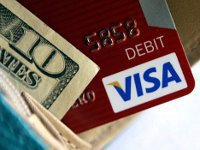Russian national payment system may cause serious damage to Visa and Mastercard
The appearance of the national payment system (NPS) in Russia is a matter of time. Sberbank CEO promised that the NPS based on the universal electronic card (UEC) would appear in the country within the next six months. Will the Russians finally get a convenient and technically simple system? Will other major players in the banking sector agree to invest in the UEC?

The universal payment card was designed to combine identification and billing functions. That is, the UEC with the "Pro100" payment system was supposed to become nearly the most important, simple, and therefore most common document for the Russians. However, it did not. First off, Russian citizens were unwilling to keep so much personal information on one carrier. Secondly, it turned out that getting a UEC was not easy. Even the few who were interested in the idea of keeping medical insurance, pension certificate, electronic wallet, transport tickets and so on in one card, had to try hard and be patient. The problem was that the process to obtain a UEC took several months, whereas getting a Visa card takes only two weeks.
"It's all because there is one center that issues these cards, independent expert Victor Liok told Pravda.Ru. - One can create many of such centers. That is, Visa has a slightly simplified technology to issue its cards, because they only have a payment application. A UEC is bigger than a payment application, there are many different structures involved there, so it took a lot of time to issue a card. I think this can be solved on another level ... One can make federal centers, these centers can be created in the subjects of the federation, and then everything will be much quicker, similar to how Visa does it now."
All in all, bankers, common Russians and the country's leadership would like to have a simple-to-use and affordable national payment system. The head of Sberbank, German Gref, has recently promised that the creation of such a system (on the base of UEC) will take six months. This statement was made at a meeting with Russian President Vladimir Putin.
"We are ready to the maximum. We have established the processing center, created a Russian chip manufactured by Sitronics - the chip is certified. An identification application has been made in compliance with all standards of international payment systems," Gref told Putin.
Thus, popular international payment systems may lose more than four billion dollars they receive each year as commissions from approximately 85 percent of transactions in Russia.
Director General of the National Agency for Financial Studies, Guzeliya Imaeva, told Pravda.Ru that the project of the Russian national payment system has already passed the pilot stage, and the project is being realized.
"This is a question of political will. If there is support to it, which we already have, then the project will be implemented within the time specified. Most likely, the project will be pegged to the portal of public services. This system, for the time being, has been adapted to the universal electronic card, which integrates capabilities of traditional plastic cards, payment instrument and an element of personalization," the expert said.
Expert Victor Liok noted that the UEC lacked public support. With the creation of the NPS, these problems should not arise, especially after Visa and Mastercard blocked the cards of four Russian banks. It seems surprising that the government has not taken any definitive steps in this direction yet. The reason why is simple. When experts talk about support from the state, they imply, of course, financial support - subsidies for the development of the national payment system.
After all, the "Pro100" payment system remained unpopular as it incurred significant costs from participating banks. Such costs could have been returned with the help of service fees, but such fees would exceed the rates of two international giants, and in this case it is clear which side people would take.
The creation of the national payment system still remains a question. Obviously, major players in the Russian banking sector may not step on the path of least resistance and may not wish to engage in the authorized capital of JSC "UEC", which is now controlled by Sberbank. The head of VTB, Andrey Kostin, advocated the creation of a national payment system without the functions of the UEC, saying that Russia needs a "simple minimum" payment system, without various personalization features and so on. It is hard not to agree with that.
Maria Snytkova
Pravda.Ru
Subscribe to Pravda.Ru Telegram channel, Facebook, RSS!




